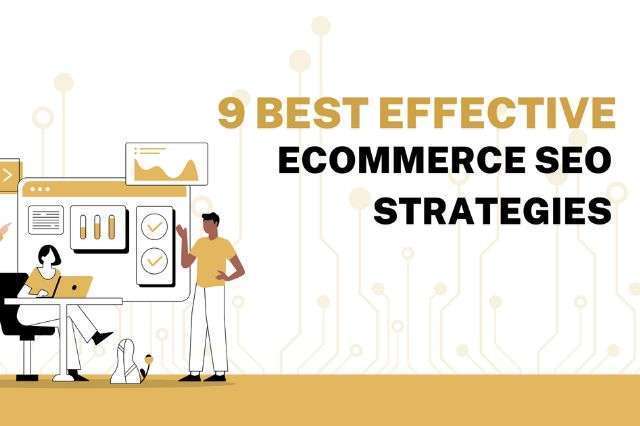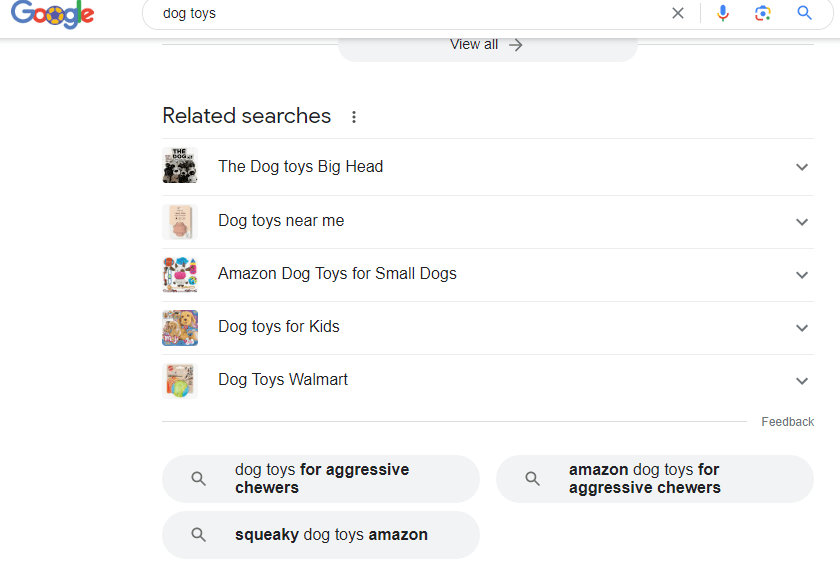9 Most Effective eCommerce SEO Strategies
eCommerce stores worldwide have opened a new avenue for customers to shop from anywhere and anytime. It has become a preferred channel to shop from due to the convenience it provides to consumers. Seeing this significant change in customer shopping behaviour, many offline stores are now also looking to launch their eCommerce stores.
But this major change to an online medium comes with its own struggles to make your business visible across search engines. In offline stores, you could bring customers through word of mouth or reference, but online, you need to have an effective SEO strategy to get noticed.
In this article, you shall learn why the success of an eCommerce store is tied to proper SEO and the most effective eCommerce SEO strategies to boost sales.
Let us begin by understanding clearly what SEO is.
What is SEO?
SEO is the acronym for Search Engine Optimization. It is the work done on and off your website to enhance its ranking on the search engines such as Google and Bing. As you might have already guessed right, an increase in ranking means enhanced visibility which in turn boosts the website’s organic traffic.
SEO is mainly of 3 types which have been depicted well in the table below:
|
|
On-Page SEO | Off-Page SEO | Technical SEO |
|
What? |
Involves optimizing your website’s on-page elements for better rank and visibility. |
The external activities applied to boost your website’s authority and credibility. |
Involves the work of backend optimization for search engine crawl and index ability. |
| Elements |
|
|
|
| Objective |
Improves your website’s relevance and search ranking. |
Enhance the value and credibility of your website. |
Ensures that your website is easily crawled, indexed, and understood by search engines. |
| Examples |
|
|
|
Related: Top 10 Critical SEO Errors of eCommerce Websites
Why is SEO the need of the hour for eCommerce stores?
SEO can provide many benefits to eCommerce websites. An SEO strategy that is well integrated with key channels can help your website thrive in these competitive times. Some of the obvious benefits that come with SEO are stated below:
1. Increase Organic Traffic:
SEO improves the traffic flow to your website by creating content that aligns with the users’ search queries. And when a website seems relevant to their search queries, users are most likely to click and engage.
2. Improved Brand Awareness:
It is obvious that when a website ranks high on the search engine result pages, users are more likely to remember the website. This improves the awareness of your brand in the minds of your target consumers.
3. Better User Experience:
A better user experience is a critical factor that determines if users will stay on your website or not. The time spent on the web page influences ranking on the SERP. The more time spent on a web page, the more the ranking potential. For this very reason, SEO improves page load speed, navigation, and other experience factors.
4. Higher Conversion Rates:
As discussed in point 1, SEO increases the flow of organic traffic to your website. This increase in traffic coming to your website means an improved potential to convert into paying customers, which leads to an improvement in conversion rates.
5. Cost-effective:
In contrast to other online marketing strategies, such as PPC, SEO can prove to be a cost-effective channel in the long run. Once you have achieved the ranking on the SERP, you continue to receive organic traffic without having to pay for clicks or impressions.
6. Long term results:
While SEO requires constant efforts to maintain the ranking, the results are more sustainable compared to paid advertisement. As compared to PPC, you get the results as long as your campaign runs.
How to optimize your eCommerce website with some effective SEO strategies?
SEO for eCommerce involves the use of an integrated strategy that aligns with the users and the search engine algorithms. Below are some of the critical SEO strategies to consider for an online store.
1. Keyword Research:
The work of search engine optimization starts with knowing what your users think & type when they search for products or services related to yours.
For Example, A user who is looking for Dog food online may search with the help of the following keywords or phrases.
- Best dog foods
- What are the best foods to feed your dog?
- Dog foods to avoid
Knowing these keywords can help you inculcate them into your content to satisfy the search intent of your target audience.
To begin, you can use Google Search to identify the keywords your target audience uses to find products and services related to yours. Below is How?
- Open Google.com
- Type the primary keyword that relates to your offering.
- For Example, if you are an online store that sells dog toys, your seed or primary keyword will be ‘dog toys’.
- Now, Google will spring up some suggestions related to your primary keywords. Note them and press enter.
- Once you arrive at the search result page, find sections such as People also ask and related searches to widen the scope of your keyword research. (See image below)
- Once you have the right keywords start inculcating them into your content for better reach and results.
Note: You can also use keyword research tools such as Google Keyword Planner or SEMrush to identify the target keywords.
2. On-Page SEO:
You optimize your website for On-page SEO to help users and search engines understand the relevancy of your content and products. For this SEO channel, consider the following points:
- Start with creating a product title and description that inculcates your target keywords in a natural flow.
- Optimize your web pages for Meta texts. Make sure that your meta texts are short and compelling to the users. These meta texts help users understand the context of your web page, which often determines whether the users click or not.
- Avoid the use of generic keywords when it comes to the structure of the URL. Ensure the URL comprises the target keywords and is descriptive enough to give a cue about the web page content to your users.
- Most importantly, consider optimizing your website content for schema markup to appear as a rich snippet on the SERP. When your web page appears as schema markup on the SERP, it provides quick information to the user, which may influence them to visit your website.
3. Mobile Optimization:
You might prefer a mobile device to browse or shop on an eCommerce website. Well, if it is a yes, know that this is true for most shoppers worldwide. To optimize for mobile is to welcome traffic coming through mobile devices on your website.
SEO takes care of the mobile aspect of your website with the help of a responsive design. A responsive design is a web design that fits its layout and elements as per the user’s screen size. This approach provides users with an enhanced user experience across all devices.
Furthermore, the speed of a website also plays a critical role in the work of mobile optimization. Slow websites frustrate users, which can lead to them leaving your website to explore that of your competitors.
Consider the following points to improve the loading speed of a website.
- Reduce the size of the images on your website.
- Say YES to browser caching.
- Reduce multiple redirects on your website.
- Use Content Delivery Network
4. Site Structure and Navigation:
A natural and well-ordered site structure provides a better UX to the visitors. Group your products into categories and then subcategories to help users and search engines navigate through your website easily.
In addition to this, make sure that your website is optimized for Breadcrumbs. By optimizing for breadcrumbs, you can help your visitors know which page they are on, which contributes to an enhanced user-friendly interaction.
Also, make sure that your product pages are internally linked with related pages to help search engines discover and index them. By doing so, you can improve the flow of authority and relevance throughout your website.
Related: Top Tips to Scale Your eCommerce Startup
5. Technical SEO for eCommerce:
Technical SEO deals with the backend aspects of your website. The main objective of Technical SEO is to make sure your website is crawlable and indexable by search engines.
It involves identifying and fixing issues such as broken links, 404 errors, and duplicate content, which can negatively impact your overall SEO efforts.
Consider the following point to optimize for Technical SEO:
- Ensure that you submit a sitemap of your eCommerce to the search engines. This helps search engines to discover, crawl and index your overall web pages on your websites
- Implement canonical tags for product pages with similar content to avoid duplicate content penalties.
6. User-Generated Content:
UGC is the content that your customers write to educate fellow customers about the products and services of your brand. It is one of the best assets for eCommerce SEO.
Encourage your customers to write about their experiences around a product or service in the form of reviews, comments or posts that you offer. This content generated by the user can act as social proof by which the potential customers may get encouraged to take action.
Remember that if there are positive reviews on your product page, the chances of getting bad reviews are also possible. To deal with this situation, make sure that you do not leave these comments unresponded. Reply in a professional way and tell your audience your side of the story.
Related: Bouncing Back From Negative Reviews
7. Content Marketing SEO:
Content marketing is the activity that concerns itself with the creation and distribution of content in the form of texts, images or videos. This SEO channel provides you with an opportunity by which you can provide valuable information about your products and services to the users.
 Create blog posts and articles relevant to your product and services with the right keywords to attract visitors. Use images and videos in your text content to improve user experience and the time spent on a web page.
Create blog posts and articles relevant to your product and services with the right keywords to attract visitors. Use images and videos in your text content to improve user experience and the time spent on a web page.
By creating well-researched and thorough content, you increase the chances of getting likes, shares and comments by the users, which in turn improves the SEO ranking.
8. Backlinking strategies:
Backlinks are anchor texts on a third-party website that direct its users to your website. The aim of doing so is to get a recommendation from another website that vows that the website linked is of value and credible.
It has been established that Google sees backlinks as a ranking factor. So it becomes critical for websites to earn quality backlinks.
Start by creating valuable content on your website that encourages third-party websites to link back to your websites. You can also reach out to relevant websites with good authority for guest posting opportunities that will add value to their readers. This helps you to expand your reach and build valuable links to your website.
9. Tracking and Measuring SEO Performance
There will always be chances when you might go astray in your SEO practice which can cost you dearly. Monitoring the performance of your SEO campaign can help you identify the areas in need of corrections.
Utilize tools such as SEMrush or Google Analytics to track key KPIs such as keyword rankings.
Related: 8 eCommerce Marketing Strategies to Kepp Your Eye On
Final Words!
In the end, SEO is a true solution by which websites can make themselves visible on the SERP. By following and implementing the above 9 key SEO practices, you can attract traffic and drive more conversions. Say yes to SEO strategy and see your website grow and thrive in these competitive times.






